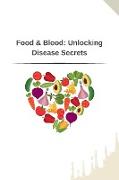Diet is a widely studied human behavior due to its essential role on individuals' health and general well-being. It has been shown to have an important role in the development and progress of several medical conditions, such as obesity (Popkin, 2001), CVD (Schaefer, 2002; Boeing et al., 2012; Dilis et al., 2012), T2D (Schwingshackl et al., 2017) and cancer (Key et al., 2004; Johnson and Lund, 2007). Due to the high burden these diseases create for individuals, society, healthcare and economy, their prevention is of great interest and importance. However, oftentimes the mechanisms by which diet affects health are still unclear. In this case, blood metabolites might be of help to at least partly provide explanations. Metabolites are small molecules that participate in human metabolism, and include omega-3 and omega-6 fatty acids, high density lipoprotein cholesterol (HDL-C), low density lipoprotein cholesterol (LDL-C), citrate, glycose etc. In the recent years, there has been immense progress in the quantification of such metabolites. This has provided the basis for investigating on the one hand how diet affects blood metabolites and on the other hand, which metabolites are indicative of diseases. Several studies have researched the relationship between diet and the levels of metabolites in blood or urine. These investigations have identified associations between the metabolic profile and coffee (Guertin et al., 2015), alcohol (Würtz et al., 2016), fruit and vegetable consumption (Menni et al., 2013), and a wide range of dietary patterns, such as Western and Prudent (Chandler et al., 2020), Mediterranean (Li et al., 2020), and healthy diet measured with several Healthy Eating indexes (Kim et al., 2021). Further, other studies have shown metabolitesto be important in the onset of several diseases, such as T2D (Suhre et al., 2010; Wang et al., 2011), CVD (Holmes et al., 2014; Würtz et al., 2015), colorectal cancer (Guertin et al., 2015; Shu et al., 2018), dementia (Lee et al., 2018; Tynkkynen et al., 2018) and increase the risk of mortality (Fischer et al., 2014; Deelen et al., 2019). Since blood metabolites are subject to change by diet and are often indicative or risk factors of several diseases, they represent a promising candidate for at least partly providing explanations to the mechanisms of dietdisease interplay.


